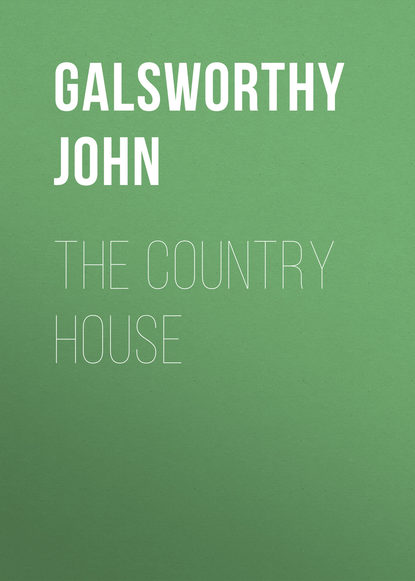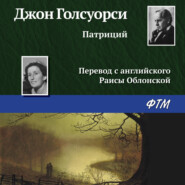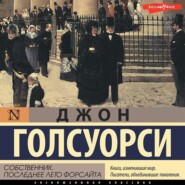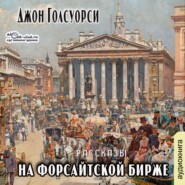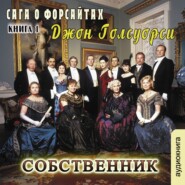По всем вопросам обращайтесь на: info@litportal.ru
(©) 2003-2024.
✖
The Country House
Настройки чтения
Размер шрифта
Высота строк
Поля
“But, George, is that right?”
“Of course it’s all right.”
“Oh, well, I don’t understand.” Mrs. Pendyce dropped her eyes, a flush came into her white cheeks; she looked up again and said quickly: “George, I should like just a little bet on your horse – a real bet, say about a sovereign.”
George Pendyce’s creed permitted the show of no emotion. He smiled.
“All right, mother, I’ll put it on for you. It’ll be about eight to one.”
“Does that mean that if he wins I shall get eight?”
George nodded.
Mrs. Pendyce looked abstractedly at his tie.
“I think it might be two sovereigns; one seems very little to lose, because I do so want him to win. Isn’t Helen Bellew perfectly charming this morning! It’s delightful to see a woman look her best in the morning.”
George turned, to hide the colour in his cheeks.
“She looks fresh enough, certainly.”
Mrs. Pendyce glanced up at him; there was a touch of quizzicality in one of her lifted eyebrows.
“I mustn’t keep you, dear; you’ll be late for the shooting.”
Mr. Pendyce, a sportsman of the old school, who still kept pointers, which, in the teeth of modern fashion, he was unable to employ, set his face against the use of two guns.
“Any man,” he would say, “who cares to shoot at Worsted Skeynes must do with one gun, as my dear old father had to do before me. He’ll get a good day’s sport – no barndoor birds” (for he encouraged his pheasants to remain lean, that they might fly the better), “but don’t let him expect one of these battues – sheer butchery, I call them.”
He was excessively fond of birds – it was, in fact, his hobby, and he had collected under glass cases a prodigious number of specimens of those species which are in danger of becoming extinct, having really, in some Pendycean sort of way, a feeling that by this practice he was doing them a good turn, championing them, as it were, to a world that would soon be unable to look upon them in the flesh. He wished, too, that his collection should become an integral part of the estate, and be passed on to his son, and his son’s son after him.
“Look at this Dartford Warbler,” he would say; “beautiful little creature – getting rarer every day. I had the greatest difficulty in procuring this specimen. You wouldn’t believe me if I told you what I had to pay for him!”
Some of his unique birds he had shot himself, having in his youth made expeditions to foreign countries solely with this object, but the great majority he had been compelled to purchase. In his library were row upon row of books carefully arranged and bearing on this fascinating subject; and his collection of rare, almost extinct, birds’ eggs was one of the finest in the “three kingdoms.” One egg especially he would point to with pride as the last obtainable of that particular breed. “This was procured,” he would say, “by my dear old gillie Angus out of the bird’s very nest. There was just the single egg. The species,” he added, tenderly handling the delicate, porcelain-like oval in his brown hand covered with very fine, blackish hairs, “is now extinct.” He was, in fact, a true bird-lover, strongly condemning cockneys, or rough, ignorant persons who, with no collections of their own, wantonly destroyed kingfishers, or scarce birds of any sort, out of pure stupidity. “I would have them flogged,” he would say, for he believed that no such bird should be killed except on commission, and for choice – barring such extreme cases as that Dartford Warbler – in some foreign country or remoter part of the British Isles. It was indeed illustrative of Mr. Pendyce’s character and whole point of view that whenever a rare, winged stranger appeared on his own estate it was talked of as an event, and preserved alive with the greatest care, in the hope that it might breed and be handed down with the property; but if it were personally known to belong to Mr. Fuller or Lord Quarryman, whose estates abutted on Worsted Skeynes, and there was grave and imminent danger of its going back, it was promptly shot and stuffed, that it might not be lost to posterity. An encounter with another landowner having the same hobby, of whom there were several in his neighbourhood, would upset him for a week, making him strangely morose, and he would at once redouble his efforts to add something rarer than ever to his own collection.
His arrangements for shooting were precisely conceived. Little slips of paper with the names of the “guns” written thereon were placed in a hat, and one by one drawn out again, and this he always did himself. Behind the right wing of the house he held a review of the beaters, who filed before him out of the yard, each with a long stick in his hand, and no expression on his face. Five minutes of directions to the keeper, and then the guns started, carrying their own weapons and a sufficiency of cartridges for the first drive in the old way.
A misty radiance clung over the grass as the sun dried the heavy dew; the thrushes hopped and ran and hid themselves, the rooks cawed peacefully in the old elms. At an angle the game cart, constructed on Mr. Pendyce’s own pattern, and drawn by a hairy horse in charge of an aged man, made its way slowly to the end of the first beat:
George lagged behind, his hands deep in his pockets, drinking in the joy of the tranquil day, the soft bird sounds, so clear and friendly, that chorus of wild life. The scent of the coverts stole to him, and he thought:
‘What a ripping day for shooting!’
The Squire, wearing a suit carefully coloured so that no bird should see him, leather leggings, and a cloth helmet of his own devising, ventilated by many little holes, came up to his son; and the spaniel John, who had a passion for the collection of birds almost equal to his master’s, came up too.
“You’re end gun, George,” he said; “you’ll get a nice high bird!”
George felt the ground with his feet, and blew a speck of dust off his barrels, and the smell of the oil sent a delicious tremor darting through him. Everything, even Helen Bellew, was forgotten. Then in the silence rose a far-off clamour; a cock pheasant, skimming low, his plumage silken in the sun, dived out of the green and golden spinney, curled to the right, and was lost in undergrowth. Some pigeons passed over at a great height. The tap-tap of sticks beating against trees began; then with a fitful rushing noise a pheasant came straight out. George threw up his gun and pulled. The bird stopped in mid-air, jerked forward, and fell headlong into the grass sods with a thud. In the sunlight the dead bird lay, and a smirk of triumph played on George’s lips. He was feeling the joy of life.
During his covert shoots the Squire had the habit of recording his impressions in a mental note-book. He put special marks against such as missed, or shot birds behind the waist, or placed lead in them to the detriment of their market value, or broke only one leg of a hare at a time, causing the animal to cry like a tortured child, which some men do not like; or such as, anxious for fame, claimed dead creatures that they had not shot, or peopled the next beat with imaginary slain, or too frequently “wiped an important neighbour’s eye,” or shot too many beaters in the legs. Against this evidence, however, he unconsciously weighed the more undeniable social facts, such as the title of Winlow’s father; Sir James Malden’s coverts, which must also presently be shot; Thomas Brandwhite’s position in the financial world; General Pendyce’s relationship to himself; and the importance of the English Church. Against Foxleigh alone he could put no marks. The fellow destroyed everything that came within reach with utter precision, and this was perhaps fortunate, for Foxleigh had neither title, coverts, position, nor cloth! And the Squire weighed one thing else besides – the pleasure of giving them all a good day’s sport, for his heart was kind.
The sun had fallen well behind the home wood when the guns stood waiting for the last drive of the day. From the keeper’s cottage in the hollow, where late threads of crimson clung in the brown network of Virginia creeper, rose a mist of wood smoke, dispersed upon the breeze. Sound there was none, only that faint stir – the far, far callings of men and beasts and birds – that never quite dies of a country evening. High above the wood some startled pigeons were still wheeling, no other life in sight; but a gleam of sunlight stole down the side of the covert and laid a burnish on the turned leaves till the whole wood seemed quivering with magic. Out of that quivering wood a wounded rabbit had stolen and was dying. It lay on its side on the slope of a tussock of grass, its hind legs drawn under it, its forelegs raised like the hands of a praying child. Motionless as death, all its remaining life was centred in its black soft eyes. Uncomplaining, ungrudging, unknowing, with that poor soft wandering eye, it was going back to Mother Earth. There Foxleigh, too, some day must go, asking of Nature why she had murdered him.
CHAPTER III
THE BLISSFUL HOUR
It was the hour between tea and dinner, when the spirit of the country house was resting, conscious of its virtue, half asleep.
Having bathed and changed, George Pendyce took his betting-book into the smoking-room. In a nook devoted to literature, protected from draught and intrusion by a high leather screen, he sat down in an armchair and fell into a doze.
With legs crossed, his chin resting on one hand, his comely figure relaxed, he exhaled a fragrance of soap, as though in this perfect peace his soul were giving off its natural odour. His spirit, on the borderland of dreams, trembled with those faint stirrings of chivalry and aspiration, the outcome of physical well-being after a long day in the open air, the outcome of security from all that is unpleasant and fraught with danger. He was awakened by voices.
“George is not a bad shot!”
“Gave a shocking exhibition at the last stand; Mrs. Bellew was with him. They were going over him like smoke; he couldn’t touch a feather.”
It was Winlow’s voice. A silence, then Thomas Brandwhite’s:
“A mistake, the ladies coming out. I never will have them myself. What do you say, Sir James?”
“Bad principle – very bad!”
A laugh – Thomas Brandwhite’s laugh, the laugh of a man never quite sure of himself.
“That fellow Bellew is a cracked chap. They call him the ‘desperate character’ about here. Drinks like a fish, and rides like the devil. She used to go pretty hard, too. I’ve noticed there’s always a couple like that in a hunting country. Did you ever see him? Thin, high-shouldered, white-faced chap, with little dark eyes and a red moustache.”
“She’s still a young woman?”
“Thirty or thirty-two.”
“How was it they didn’t get on?”
The sound of a match being struck.
“Case of the kettle and the pot.”
“It’s easy to see she’s fond of admiration. Love of admiration plays old Harry with women!”
Winlow’s leisurely tones again
“There was a child, I believe, and it died. And after that – I know there was some story; you never could get to the bottom of it. Bellew chucked his regiment in consequence. She’s subject to moods, they say, when nothing’s exciting enough; must skate on thin ice, must have a man skating after her. If the poor devil weighs more than she does, in he goes.”
“That’s like her father, old Cheriton. I knew him at the club – one of the old sort of squires; married his second wife at sixty and buried her at eighty. Old ‘Claret and Piquet,’ they called him; had more children under the rose than any man in Devonshire. I saw him playing half-crown points the week before he died. It’s in the blood. What’s George’s weight? – ah, ha!”
“It’s no laughing matter, Brandwhite. There’s time for a hundred up before dinner if you care for a game, Winlow?”
The sound of chairs drawn back, of footsteps, and the closing of a door. George was alone again, a spot of red in either of his cheeks. Those vague stirrings of chivalry and aspiration were gone, and gone that sense of well-earned ease. He got up, came out of his corner, and walked to and fro on the tiger-skin before the fire. He lit a cigarette, threw it away, and lit another.





